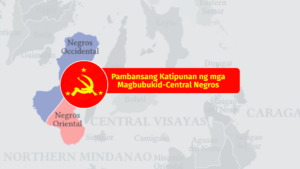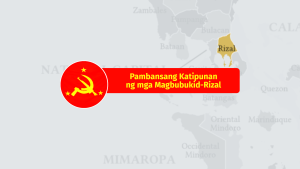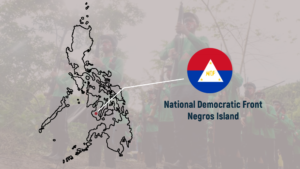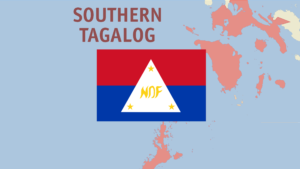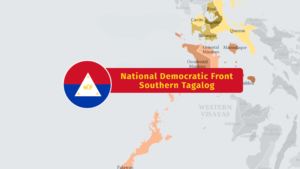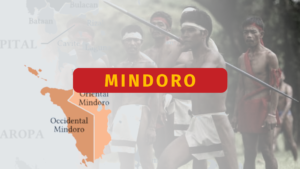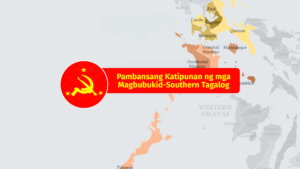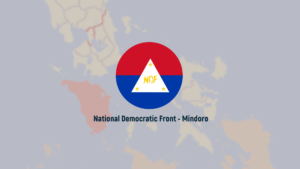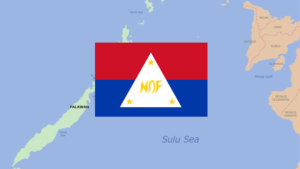Unite and Struggle for a Patriotic, Mass, and Scientific Educational System! Junk the Anti-people “Blended Learning” Program!
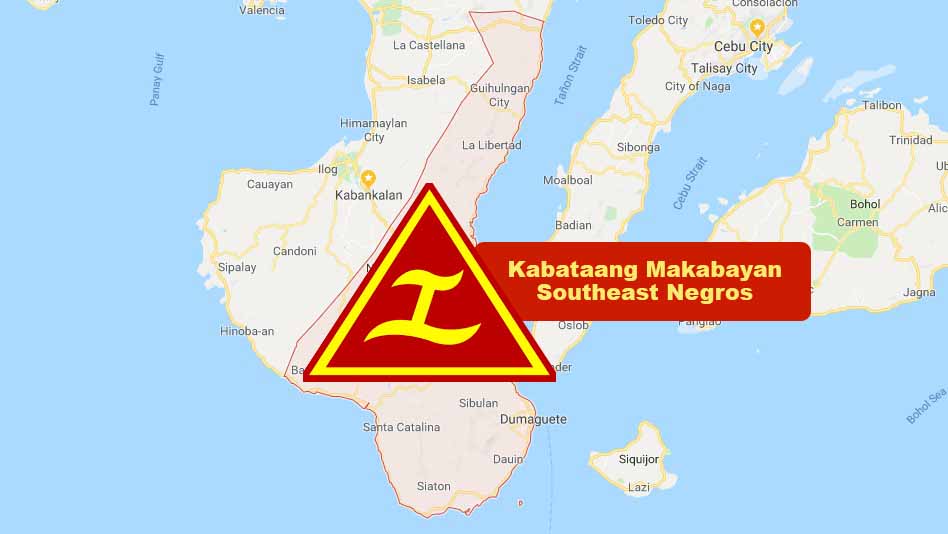
When the COVID-19 pandemic, and the resulting disaster of crisis proportions due to the US-Duterte regime’s neoliberal economic policies, the people’s sufferings and hardships have been made worse, in terms of food consumption, work and livelihood, education, health, and other basic human needs.
For the masses of settlers inhabiting the mountainous communities in the 3rd district of Negros Oriental, who are already economically distressed, the difficulty of availing of education has worsened, due to the present “blended learning” program.
Given the choice between online and modular learning, most students and their parents practically can only opt for the latter, since in the hinterlands internet signal / coverage is not a luxury that they have, aside from the question of purchasing the necessary gadgets, which is somewhat problematic given that they already struggle to put food on the table, can barely afford to purchase dried and salted fish, onions, garlic, salt, cooking oil, milk / coffee, sugar, and other kitchen / cupboard needs.
In the case of modular learning, what is overlooked is the fact that most parents in the settler communities barely finished elementary. Only a fortunate few have even reached, not to mention finished, high-school. In one particular Sitio, only a single individual living there was able to finish high school. As a result, due to the arrangement of parents serving as teachers, most families decided to postpone their children’s education, and wait for the resumption of normal face-to-face schooling.
The present blended learning program is not in correspondence with the reality faced by Filipino parents and their student children, the vast majority of which are based in the countryside.
The current, actual conditions are such that much of the waking time of peasant families is devoted to production, chiefly for their subsistence, food consumption and other material needs; aside from their already heavy workload, the blended learning program makes them carry the additional burden of teaching their children, in the case of modular distance learning, making their lives that much more stressful as it is, given that peasant householders usually dedicate most their time to production, sometimes even missing out on attending to household duties and quality-time with family, due to the sheer busyness with the farm and other sideline occupations.
With regards to online learning, it’s not only the gadgets, internet connection, load / data costs that are the obstacles and problems. The primary issue is that, in the prevailing conditions affecting the majority of peasant families in much of the countryside, households act as a unit in production and collectively, as a family, endure various forms of feudal and semi-feudal exploitation.
Furthermore, blended learning adds another layer of burden on the part of teachers, who are already troubled with the lack of finances, lack of ample training and practice, lack of facilities, and others.
In essence, the blended learning program is anti-people. It does not root itself in the concrete situation faced by parents and students.
Blended learning is not an appropriate solution to the problems faced today in the field of education. Pressingly, the education budget, in terms of wages, training, facilities, along with other basic services need to be pushed and struggled for.
There is no other solution to achieve an educational system that’s truly in the service of the youth other than to struggle for a patriotic, mass, scientific educational system. This can only be actualized through solid unity of the people, perseverance in waging the national democratic revolution through protracted people’s war.
[HILIGAYNON] Maghiusa ug pakigbisogan ang maki-nasudnon, pangmasa ug siyentipiko nga sistema sa edukasyon! Ibasura ang anti-masa nga programang blended learning!
Sa paghapak sa pandemya ug paggrabe sa krisis tungod pagpatuman sa rehimeng US-Duterte sa mga neoliberal nga ekonomikanhong palisiya, mas misamot ang nasinating pag-antus ug kalisod sa katawhan hisgutanan sa pagkaon, panginabuhian, edukasyon, panglawas ug uban pang batakang panginahanglan.
Alang sa mga settler sa mga bukiron nga komunidad sa 3rd District sa Negros Oriental, nga nag antus na daan sa grabe nga ekonomikanhong kalisod, ang problema sa pagtapos og eskwela gipasamot tungod sa blended learning nga programa.
Taliwala sa online ug modular learning, ang praktikal na mapili sa mga ginikanan ug estudyante nga nagpuyo sa bukid kay ang modular. Tungod kay hinay kaayo ug wala-wala ang signal sa internet, ug subay usab sa kakayahan nga mopalit og mga gadget, nga naglisod naman gani pagpalit og sud-an ug uban pang panginahanglan sa kusina sama sa bulad, ginamos, bombay, ahos, mantika, asin, kape, kalamay, ug uban pa.
Kung sa kaso sa modular distance learning, wala ma konsidera ang realidad na mayorya sa mga ginikanan sa mga settler na komunidad wala gani naka tiwas og elementary; ug pipila ra kabuok ang naka abot, ug kaha naka tiwas, og high school. Sa usa ka partikular na Sityo, usa ra kabuok ka residente ang nakatiwas ug high school. Tungod niini na areglo na ang mga ginikanan ang magsilbi isip magtutudlo, daghan sa kanila ang nag desisyon na dili usa ipa eskwela ang ila mga bata, ug mag hulat nalang sa pagkabalik sa normal face-to-face na pageskwela.
Ang gipaduso karon nga programang blended learning dili haum ug wala motakdo sa realidad nga giatubang sa mga ginikanan nga ang mayorya anaa sa kabukiran.
Pagkakaron ang dako nga panahon sa mga pamilyang mag-uuma anaa sa produksyon alang sa pagkaon ug uban pa nilang materyal nga panginahanglan. Kon idugang pa niini ang pagtudlo sa ilang kabataan sa kaso sa modular distance learning, naghatag kini sa dugang palas-onon sa mga ginikanan nga halos wala na gani panahon sa ilang pamilya ug dili na nimo makaplagan sa ilang panimalay kay anaa kanunay sa uma.
Kon sa online learning usab, dili lang ang gadgets, internet connection ang problema ug kalambigit nga hisgutan sa galastuhan alang sa data. Una sa tanan dili kini mosibo sa kahimtang sa mayorya sa pamilya nga anaa sa kabukiran nga nag-akto isip unit sa produksyon ug nagsagubang sa nagkalain-laing pyudal ug alang-alang pyudal nga pagpahimulos.
Naghatag usab kini sa mga dugang andana sa palas-anon sa mga magtutudlo nga kulang sa gikinahanglang abag sa pinansya, igong panahon sa pagbansay, pasilidad ug uban pa.
Sa batakan, ang blended learning usa ka anti-masa nga programa. Wala kini maka-angkla unsa ang konkretong sitwasyon sa mga ginikanan ug kabataan.
Dili solusyon ang blended sa mga problema nga gitaubang karon sa edukasyon. Sa hinanali kinahanglanglang ipaduso ang pagpataas sa badget sa edukasyon alang sa suhulan, pagbansay sa mga magtutudlo, pasilidad kadungan ang uban pang mga batakang serbisyo.
Walay laing kasulbaran aron maangkon ang usa ka mabulukon nga edukasyon alang sa mga kabataan kundili ang pagpakigbisog alang sa usa ka maki-nasudnon, pangmasa ug siyentipiko nga sistema sa edukasyon. Makab-ot kini pinagi sa hugot nga panaghiusa sa tibuok katawhan diha pursigido nga pagpa-asdaang sa Nasudnon-Demokratikong Rebolusyon Pinaagi Sa Malanatong Gubat Sa Katawhan.

